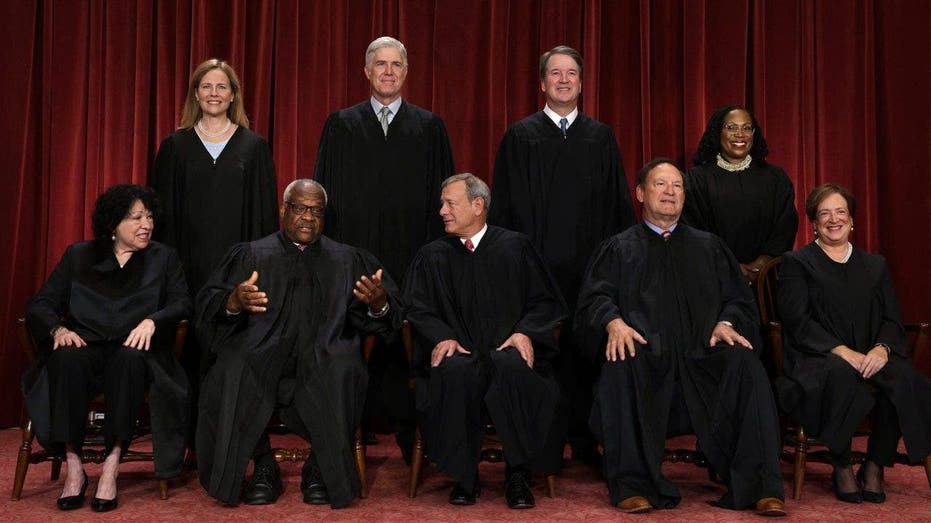The Supreme Court will begin its new term next week– the First Monday in October– amid lingering internal strife over several recent rulings, with details of its thorny internal deliberations selectively leaked to certain media outlets.
All of this as the nine justices have come under increasing public scrutiny and criticism– over perceived blatant partisanship on hot-button issues, ethics controversies, and its own wilting reputation as a body remaining above politics.
“The Supreme Court, in a sense, is on the ballot this election, or at least the future of the Supreme Court,” said Thomas Dupree, an appellate attorney and former top Justice Department official. “So any time the court wades into political waters, it’s going to be upsetting people, people who are on the side that loses. And they’ll say the court shouldn’t have got involved in the political fray. The court recognizes that it’s not something that it wants to do, but in some cases, it has no choice.”
Here are five questions confronting the Supreme Court:
1. With the November election nearing, could the Supreme Court get involved?
Directly or indirectly, the nine members of the Supreme Court could again play an outsized role in determining who will be the next president.
There is no indication yet of another Bush v. Gore, where the justices in 2000 ended ongoing litigation over the Florida election results, essentially handing the presidency to George W. Bush.
But the high court four years ago summarily refused to consider a series of lawsuits from Trump and other Republicans in five states President Joe Biden won: Arizona, Georgia, Michigan, Pennsylvania, and Wisconsin.
Former president Donald Trump has again promised court challenges if he loses, and in a recent social media post said this election “will be under the closest professional scrutiny,” adding “people that cheated will be prosecuted to the fullest extent of the Law.”
Trump has proceeded with his campaign without the imminent cloud of legal jeopardy hanging over his head. His criminal sentencing in the New York business fraud conviction has been postponed until November at least.
And his two separate federal cases involving document mishandling and 2020 election interference have been deferred indefinitely. Those prosecutions could disappear entirely if Trump is elected and he dismisses the Justice Department’s Special Counsel.
All this after the Supreme Court in July ruled former presidents enjoy a substantial amount of immunity for “official acts” committed in office. Trump has used that ruling to demand both of his federal cases be dismissed.
Two justices took the unusual step of commenting publicly on its effect.
“You gave us a very hard question,” Justice Neil Grouch told Fox News’ “America Reports co-anchor” Sandra Smith exclusively. “It’s the first time in American history that one presidential administration was seeking to bring criminal charges against a predecessor. We had to go back and look at what sources were available to us.”
The Trump appointee said the Supreme Court ruled in Nixon v. Fitzgerald (1982) that civil claims cannot be brought against a president, “presumptively, in his official capacity, after he leaves office. Why? Because that would chill him from exercising the powers and duties of a president while he is president,” Gorsuch said. “He would be overwhelmed. His political enemies would simply bring suits against him forever more.”
But Justice Ketanji Brown Jackson, who was on the losing side of the 6-3 opinion, has taken another approach.
“I was concerned about a system that appeared to provide immunity for one individual under one set of circumstances, when we have a criminal justice system that had ordinarily treated everyone the same,” she told CBS News while promoting her new book, “Lovely One: A Memoir.”
The Supreme Court has already gotten involved in several pre-election challenges: allowing some redistricting maps for congressional seats to go into effect, and blocking others.
And the justices last month allowed Arizona to temporarily enforce its law requiring proof of citizenship on state voter registration forms.
2. What is the latest on calls for ethics reform at the Supreme Court?
Five days before President Biden withdrew as a candidate for re-election, he made the Supreme Court a major political issue.
Word leaked from the White House on July 16 Biden was seriously considering proposals to establish term limits for the justices, and an ethics code that would be enforceable under law, amid growing concerns they were not being held accountable.
The proposal was made public days later, including a congressional law limiting justices to 18-year terms, despite the Constitution’s guarantee of life tenure for all federal judges.
Biden framed it as an effort to address “recent extreme opinions the Supreme Court has handed down [that] have undermined long established civil rights principles and protections.”
Public calls for changes came after revelations of previously undisclosed free trips and gifts by the justices, and lucrative book deals. Recent public polls support greater ethics reform.
Other federal judges are bound by an enforceable code of conduct, but the high court had long resisted being included.
Under Chief Justice John Roberts’ leadership, he and his colleagues adopted a revised code last year, but it still lacks any enforcement mechanism, which critics say makes it feckless and ineffective.
Fox News previously reported the Court had been meeting privately for months on how to structure a new ethics code, one that would address public concerns over its behavior without abdicating what Roberts in particular had said was the court’s independence on such matters from congressional oversight.
So the justices have near-total discretion to decide whether to abide by the new code.
But growing– and very public– calls for more have come from some justices in recent days.
“A binding code of ethics is pretty standard for judges,” said Justice Jackson, “and so I guess the question is: Is the Supreme Court any different? I guess I have not seen a persuasive reason as to why the court is different.”
“I am considering supporting it as a general matter,” she said. “I’m not going to get into commenting on particular policy proposals, but from my perspective, I don’t have any problem with an enforceable code.”
And Justice Elena Kagan, perhaps the most vocal advocate for an enforcement provision, said this month. “It seems like a good idea in terms of ensuring that people have confidence that we’re doing exactly that. So it seems like a salutary thing for the court.”
Senate Judiciary Committee Chairman Dick Durbin (D-IL) told the Chief Justice this month the unilateral ethics code adopted by the justices falls short and needs an enforcement trigger.
In a closed door meeting with federal judges attending a semi-annual policymaking conference at the high court, Durbin was seated next to Roberts and made clear failure by the justices to strengthen their judicial code of conduct could prompt congressional intervention.
Sources say Roberts made no commitments but thanked Durbin for the ongoing dialogue on the issue.
But Justice Gorsuch urged caution, telling “Fox News Sunday” host Shannon Bream last month that he did not want to get into “what is now a political issue during a presidential election year.”
He added about the role of an independent judiciary: “It’s there for the moments when the spotlight’s on you, when the government’s coming after you. And don’t you want a ferociously independent judge and a jury of your peers to make those decisions? Isn’t that your right as an American? And so I just say, be careful.”
TOP DEM PLOTS TYING SCOTUS FUNDING TO ‘ENFORCEABLE’ ETHICS CODE AMID THOMAS, ALITO CONTROVERSIES
3. What is Behind All the Recent Headlines over Justice Barrett’s Role on the Court?
Following the contentious conclusion of the court’s term in July, much was written about the “Barrett Factor”– and the supposedly evolving jurisprudence of Justice Amy Coney Barrett.
She has become something of a recent lightning rod on the right and left, over her occasional willingness to depart from her fellow conservatives, especially in cases involving the man who appointed her in 2020.
The 52-year-old Barrett took issue with some conclusions in the former president’s historic immunity ruling, and criticized parts of the majority ruling keeping him on the ballot in Colorado.
And breaking with conservatives, she separately authored pointed dissents on an obstruction case dealing with a 2021 U.S. Capitol riot suspect; and an environmental case on federal rules to manage downwind air pollution.
Many court watchers on the left characterized her “burgeoning” legal reasoning as an “independent streak,” increasingly ready to “skewer” her right-leaning colleagues, and a “principled voice in the middle” with a strong set of principles that present a “different world view” from other conservative justices.
But other legal observers say it is too early to dub Barrett the new deciding vote on hot button cases, who would resist walking lockstep with any ideological bloc.
“I don’t think she’s really trying to become the ‘swing’ justice or auditioning for that role. She’s calling these cases as she sees them and she’s, generally speaking, a conservative justice,” said Dupree. “But what we’ve seen over the last term is Justice Barrett really coming into her own. She has the confidence to write separately and in some cases to break from the other conservatives when she sees the law a little differently. I suspect that will continue.”
And it remains clear Barrett’s conservative credentials in most cases are solid: she has ruled to strike down Roe v. Wade, expand gun rights, and scale back affirmative action in higher education.
SCOTUS GIVES PARTIAL VICTORY TO GOP TRYING TO ENFORCE PROOF OF CITIZENSHIP TO VOTE IN ARIZONA
4. What about the politics of Supreme Court vacancies in a Harris or Trump White House?
We recently highlighted potential Supreme Court nominees in another Biden or Trump administration, based what sources in both camps exclusively told Fox News.
Now the dynamic has shifted, with Vice President Kamala Harris heading the Democratic ticket.
Campaign sources say the whirlwind of taking over the nomination from her boss in recent weeks has left Harris, her legal advisers, and campaign team little time to focus on the what-ifs of choosing justices, or broader legal policy.
But it is a topic of particular interest to the former prosecutor, state attorney general, and member of the Senate Judiciary Committee.
Administration sources say since taking office, she has been part of the inner circle cultivating an informal White House list of high court possibles. And Harris was deeply involved in spearheading Justice Jackson’s selection and confirmation in 2022, Biden’s only Supreme Court nominee.
As a senator, her 2018 questioning at the confirmation hearings for now-Justice Brett Kavanaugh were especially contentious, and she later called for his impeachment, following unproven allegations of past sexual misconduct.
Harris herself was under serious consideration for a Supreme Court seat during the Obama years, but sources say her percolating ambitions at the time were directed to elected office.
As for Trump, sources close to him tell Fox News he is expected to soon release his own pre-emptive list of candidates, as the Republican nominee did in 2016. That evolving list of two dozen or so names became a centerpiece of his successful campaign and later presidency.
This time, the former president will rely on those he has already named to the federal bench for the top names he would choose from to fill any Supreme Court vacancy.
5. The Supreme Court seems to be receiving a lot of negative public attention, so what can the justices do about it?
The Constitution’s framers viewed the judiciary as the “least dangerous branch,” but to hear some politicians and pundits on both the left and right, the Supreme Court is prepared to lead the country into imminent ruin.
Such attacks on the justices are nothing new, but the tenor of the criticism– especially in a presidential year– coupled with self-inflicted missteps on ethics and docket discretion– have combined to put its nine members on the defensive.
And the public seems to have noticed.
A Gallup poll this summer found just 43% approve of how the Supreme Court handles its job, with 52% disapproval. That is a drop of 15-points since 2020 (58-38). In 2000, 62% approved of the institution.
Especially concerning the court are continued leaks to the media of its internal, mostly secretive, operations.
A draft opinion of the 2022 “Dobbs” abortion case– published two months before the final ruling that struck down nationwide access to the procedure– sent shock waves in Washington, in a massive breach of protocol.
That was followed by selective leaks the past year over how the court decided hot-button issues like affirmative action and election redistricting.
And in recent weeks, the “New York Times” received leaked internal memos from the Chief Justice over his leading role in the Trump immunity opinion.
Court sources say the leakers– who have never been publicly identified– have further eroded an institutional camaraderie and trust among the justices, long seen as essential to doing their jobs. It has led to outside partisan finger-pointing.
Roberts– who will gavel in his 20th term next week as Chief Justice– has not publicly responded to the latest controversies or calls for ethics reform, declining repeated invitations from the Senate to testify.
It reflects his “less is best” approach to explaining and promoting his own court’s resolution of thorny legal and political issues.
In September 2022, after the abortion ruling was issued, he said, “Simply because people disagree with opinions, is not a basis for questioning the legitimacy of the court. I think just moving forward from things that were unfortunate is the best way to respond,” he said.
And he has carefully glided over his role to force internal change, and to defend his court’s reputation– all while being unable to stop the continuing leaks over their deliberations.
“It seems like at times they’re [leakers] motivated to be able to potentially lead to mistrust in the [judicial] branch– attacks on what the branch is doing,” said Jennifer Mascott, a former law clerk to Justice Thomas and then-Judge Kavanaugh, and now a Catholic University Law Professor.
Added Dupree: “You can’t have a court deliberate and perform its constitutionally assigned function if it can’t be ensured of the sanctity of its deliberations, if it thinks that anything that one justice says to another colleague or any memo that they write internally is going to appear on the front page of the newspapers the next day. That’s a very, very worrisome trend. It may be the new normal.”
After a three-month recess, the justices met together for the first time this week to reset their docket, and discuss appeals that have filed up over the summer.
Sources say the chief justice– who leads the closed-door meeting– had sent a memo to his colleagues indicating some of the controversies surrounding the court like the leaks and ethics reform– would be privately and candidly discussed.
The Supreme Court in the term that starts next week will confront issues like gun rights and transgender care for minors, with pending appeals over the Affordable Care Act, religious freedom, immigration, and abortion access.
It is a unique, fast-moving time of change and challenge at an institution used to slow and deliberate.
“I did learn early on that when you are holding the reins of leadership you should be careful not to tug on them too much,” said Roberts in 2016. “You will find out they aren’t connected to anything.”
























